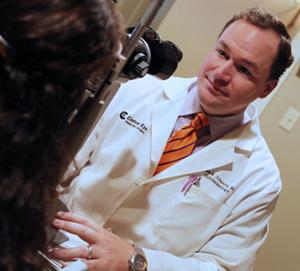Posted by: Clemson Eye in News

Upstate Parent, August 2014
Awareness among parents and teachers about the importance of helping children have healthy vision is a key consideration as kids head back to the classroom.
Brian Johnson followed his instincts and
An ophthalmologist with Clemson Eye, Johnson does not treat children, but he did recognize a problem with his infant son’s eye.
“When he came home from the hospital, I was looking at his eyes and I could tell something didn’t look quite right,” Johnson said.
His son, Brock, is now a happy 5-year-old boy. The problem his father found turned out to be a cataract, a problem with the eye’s lens that can affect vision. Johnson consulted a pediatric ophthalmologist immediately and Brock had surgery to remove the cataract. Johnson said the condition is rare, occurring in one of every 10,000 children.
August has been designated as Children’s Eye Health and Safety Month by the American Academy of Ophthalmology and Prevent Blindness. The designation raises awareness among parents and teachers about the importance of helping children have
Johnson said it is important for parents to trust their instincts and discuss any concerns about their child’s vision with their pediatrician. During well-child visits, Johnson said pediatricians are primarily looking for specific vision concerns, including a type of cancer and whether the eyes are crossing. It is up to parents to ask questions and let their child’s doctor know if something seems abnormal.
“Often, parents will observe or have
Johnson said a child’s eyes may differ from each other in photos — with one eye appearing white, for example — which should be pointed out to the child’s pediatrician. A referral to a pediatric ophthalmologist may be warranted.
If a condition affects only one eye, it is still important to address it, Johnson said.
“If it is in only one eye, the brain quickly adapts,” he said, which can lead to a lazy eye.
“When a child is really young, it can be quite difficult to know how their vision is,” Johnson said.
Children may squint, sit too close to the TV or act as if they have trouble seeing things.
Johnson thinks all children should have an eye exam prior to starting school.
“Once the child knows the alphabet, it is important to have the eyes checked,” Johnson said. “Some states require an eye exam before school. South Carolina doesn’t have that requirement, but it is a good idea.
“According to Prevent Blindness, a volunteer eye health and safety organization dedicated to fighting blindness and saving sight, vision impairments are common conditions among young children, affecting 5 –10 percent of all preschool-aged children, and if not detected and treated early, vision impairment could affect all aspects of life, negatively impacting a child’s ability to learn, athletic performance and self-esteem.
Johnson said parents should be sure to discuss concerns with their child’s pediatrician first, but then seek other help if needed.
“If there is ever a concern or an emergency, it’s a good idea to contact an ophthalmologist directly,” he said.
Click here to visit the original article on Greenville News